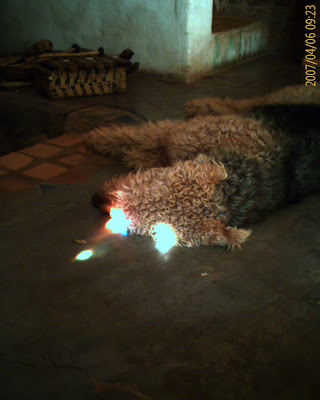Why have I had a consistent feeling all my (english speaking) life that there are a large percentage of thoughts, feelings and experiences for which there are no words? I don't consider myself to be a slouch when expressing myself verbally, and the English language is not exactly deficient in this area either, but I have noticed from my brief brushes with other languages eg. French, that the focus of expression is different, to the point that French can express concepts that English can't, and vice-versa.
And i'm not speaking so much here of the oral aspect, more of the mode in which we think. I have some glimpse of it due to the fact that I'm fluent in two languages of different origin, namely English and Afrikaans, but it's clear I have to learn more languages, from different origins.
Still, I regularly find that I am unable to express myself (to myself) because there does not appear to be a specific word that is even an approximation to what I am experiencing. What to do? Should I be inventing words, or a new language? Both are mammoth tasks, and a bit woolly to boot.
And let's not even get into the philosophy of the need to name things. I have had many passionate discussions surrounding the process of naming things, versus simply experiencing them sans labels, but lets be honest, no man is an island, and the nature of being human is the sharing of experience. What is the point of love, otherwise? What is the point of hate, otherwise?
How does one share experience, without the language to express it? The ability to communicate effectively is an evolutionary advantage, and is desirable. Surely as time passes, it is considered progress to be more (NOT less) able to share life experiences by describing them?
I propose that all language is actually Meta-Language. As an example, consider the following scenario: you are engaging in an activity with a friend, lets say for eg. African Drumming. There seems to be an understanding between you, and there is communication on a theme. Put that into words? Or you listen to a classical music piece, and you know, across the centuries, what the composer was trying to say. Put that into words? (Note the music aspect here) How about wine afficionados.... "Lightly wooded with a strawberry overview and a nutty afterhint" (Note the smell aspect here) Or you share a particularly intense game of squash with a friend, that flows like a dance (note the physical and dance aspects here)
All language is describing experience, on one level or another, and we all have those experiences. Language is the way we describe it to ourselves, NOT the experience itself, but there is no real memory of the experience, if we don't have a language to describe it to ourselves. Only after that does the sharing of experiences come.
Hmm.. I can see I will have to express myself better.
Subscribe to:
Post Comments (Atom)

1 comment:
"but there is no real memory of the experience, if we don't have a language to describe it to ourselves."
I disagree with that.
Emotional memory can be *far* stronger, deeper, more vivid and longer lasting than verbal/ articulated memories. In fact emotional memory can totally alter your life and brain - sometimes pretty much permanently.
The birth experience is a prime example of this. Even though the chemicals at play are almost designed to make you forget the experience (consciously) the emotional component is massively impactive and completely unforgetable. It is even almost indescribable.
That said, I think I get what you are trying to say. ;)
Post a Comment